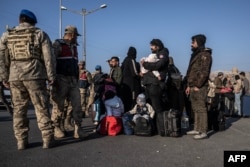Hundreds of Syrian refugees lined up Monday at Turkey’s southern Oncupinar border crossing in Kilis province to return to their homeland after the overthrow of Syrian President Bashar al-Assad.
Syrians who spoke to VOA Turkish said they were happy to soon be back in their country, as they saw a new beginning there.
Muhammed Taha, who crossed into Turkey in 2014, was among the Syrians in line at the crossing to return to his hometown of Aleppo with his five children, four of whom were born in Turkey.
“Justice has been served,” Taha said. “I could not return to my country before because of the war. Thank God, the war is over. The clashes have ended.”
He added, “I will apply to go to my hometown, Aleppo, with my five children soon. I believe we will be more peaceful there. I will be reunited with my relatives and friends there.”
Many Syrians expressed their wish to reconstruct their war-torn country after their return.
Ahmed Mansur, who came to the border crossing from southern Gaziantep province with his parents and family of four, thanked Turkey for hosting them during the war in Syria, but stated that this is the time to return home.
“Assad destroyed our country. Thank God, he fled in the end. We will start everything from scratch in our country. We will repair our destroyed homes and try to hold on to life by working there,” Mansur told VOA Turkish.
Before returning, Syrians must hand over to authorities the temporary identity cards they received in Turkey and sign the voluntary return form.
Refugees from Aleppo
Most of the Syrians at the border crossing were from Aleppo, which the rebel forces, led by Hayat Tahrir al-Sham, captured in a lightning offensive last week.
According to Turkey’s Presidency of Migration Management, 2.9 million Syrians were under temporary protection as of November 28, as Turkey does not give refugee status to Syrians, citing its geographical limitation to the 1951 Geneva Convention.
Turkish Interior Minister Ali Yerlikaya said Monday that over 1.2 million Syrians in Turkey are from Aleppo.
Turkish President Recep Tayyip Erdogan announced Monday that Turkey opened its Yayladagi border gate, which has been closed since 2013, to facilitate the safe and voluntary return of Syrians.
“We will also manage the processing of immigrants’ voluntary returns in a way befitting our hosting,” Erdogan said.
Concerns
While the collapse of the 61-year-long Baathist regime was widely celebrated by Syrians in Turkey, returning is no longer that easy for some after more than a decade living abroad.
Emine Afare, 36, is among the refugees who are undecided about returning. After leaving Aleppo in 2013, she now resides in the Basmane district of Izmir, which hosts a large Syrian and African immigrant community.
Afare said she could not describe the joy she felt at the release of many of her relatives who were imprisoned by the Assad regime. However, she said she believed that a strong social and economic infrastructure was needed after the yearslong conflict.
“According to the news we received from Aleppo, 20% of education and health services are operating. It will take at least two years to complete this. Electricity and water must be provided. Our homes, hospitals and schools must be rebuilt. This requires a lot of work. I will then decide to return,” she told VOA Turkish.
The mother of two children who were born in Turkey, Afare said her 8-year-old daughter does not speak Arabic, and Syria is now a foreign country to her.
“There is a generation born in Turkey. Since 2011, this generation has received education in Turkey and adopted Turkish culture. They are now foreigners to Syria,” she said. “We are thinking about how these children will integrate into Syria.”
Muhammed Salih Ali, head of the Association for Solidarity with Syrian Refugees in Izmir, reiterated Afare’s concerns about the younger generation.
“Social adaptation is now required for them to return to Syria. It is very difficult for this generation to return. But if their family has their own land, they will have to go with them. But they will have a hard time,” he said.
Ali, who fled Al-Hasakah and settled in Turkey 25 years ago, believes that the number of people returning to Syria will increase from now on.
“I have waited for this moment for 25 years. I cannot describe my happiness that this oppression has ended,” he said.
Ali thinks that more than half of the Syrian refugees in Turkey will return to Syria, as many of them are landowners. But he emphasized that there is a dire need for help to reconstruct the country.
“Syria alone does not have the means to do this. The Syrians will return. The people will start over, but many means need to be provided. We are calling on every country, asking them to help us,” he said.
VOA Turkish’s Ezel Sahinkaya contributed to this report from Washington.



